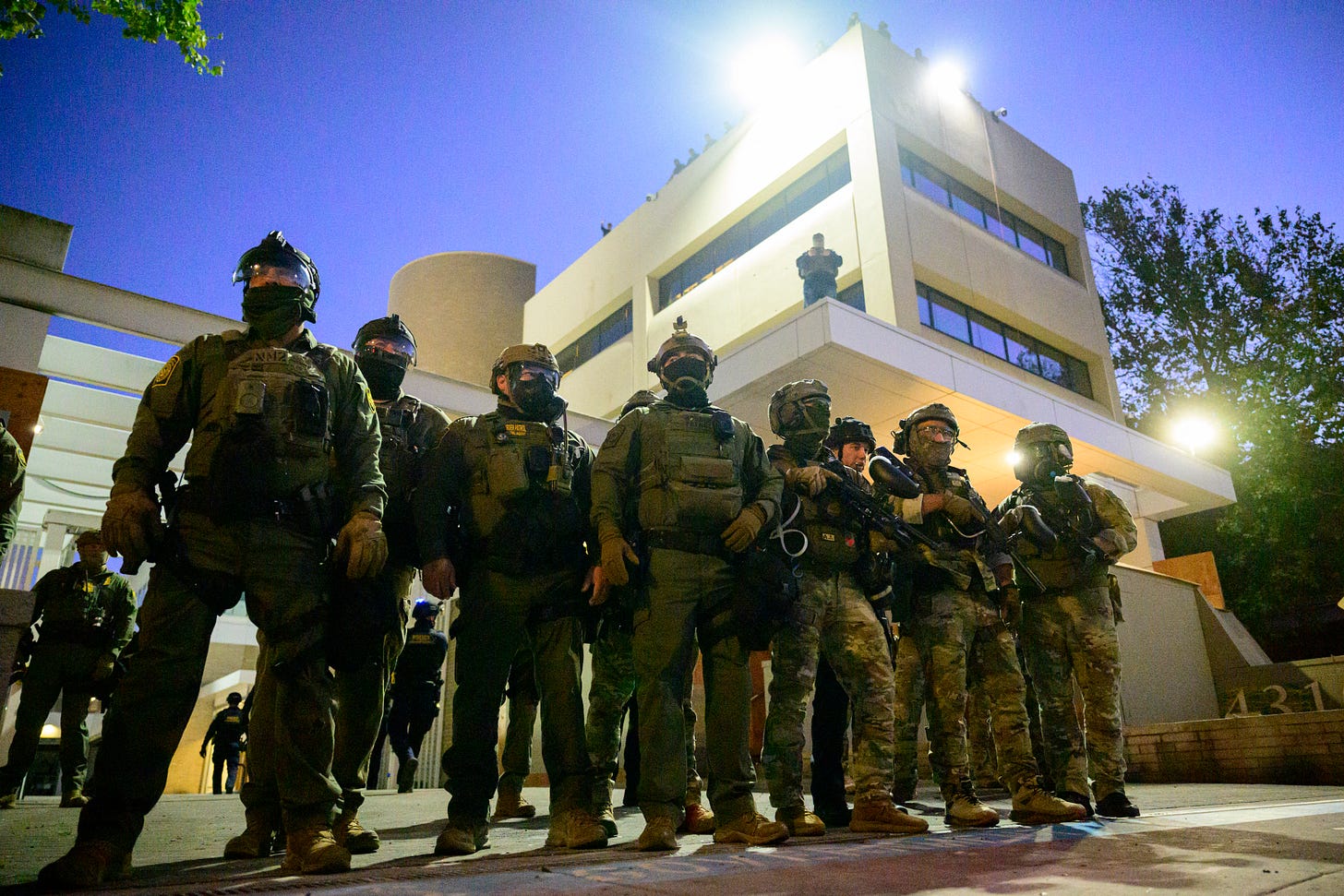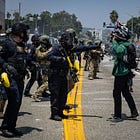On Authoritarian Theater
We need a sane border regime. These ICE raids ain't it.
Today’s piece was written by Isaac Saul. You can check out his newsletter Tangle here.
In recent weeks, President Donald Trump has deployed Illinois National Guard troops to Chicago and attempted to mobilize the National Guard to Portland, Oregon, leading to arrests and clashes with protesters in those cities.
On Saturday, a federal judge (who was appointed by Trump in his first term) temporarily blocked the administration from deploying the Oregon National Guard to Portland. Judge Immergut found that the size and nature of immigration protests in the city did not justify mobilizing the Guard, writing that President Trump’s statements to the contrary were “simply untethered to the facts.” The order will remain in effect for 14 days, unless extended. In response, the Trump administration filed a notice of appeal to the 9th U.S. Circuit Court of Appeals.
The same day, tensions between Immigration and Customs Enforcement (ICE) officers and protesters escalated in Chicago when federal agents were allegedly rammed and boxed in by 10 cars near an ICE facility. Officers fired shots at a woman in one of the cars, saying that she was armed with a semi-automatic weapon. No one was seriously hurt, but Department of Homeland Security Secretary Kristi Noem announced that additional personnel would be deployed to the area in response to the incident.
Then, on Sunday, Secretary of Defense Pete Hegseth called up 400 members of the Texas National Guard for deployments to Portland, Chicago, and other cities to support federal agents and protect property.
On Tuesday, hundreds of federal officers carried out a large-scale raid at an apartment building in Chicago, leading to a reported 37 arrests of alleged unauthorized immigrants. The raid—a joint operation involving multiple federal agencies and utilizing Black Hawk helicopters—targeted a residential building allegedly frequented by members of the Tren de Aragua gang. However, witnesses and residents said that nearly every building resident was detained, including children and U.S. citizens, in some cases without clear explanations for their arrests.
White House officials say the law enforcement activity in Illinois is necessary to maintain public safety in and around Chicago while also protecting immigration authorities from heightened threats.
Also on Tuesday, President Trump suggested in a meeting with military leaders and Secretary Hegseth that cities like Chicago should be “training grounds for our military,” describing the unrest over immigration enforcement and federal troop deployments as “a war from within.” The comments drew strong rebukes from Chicago Mayor Brandon Johnson and Illinois Governor JB Pritzker. “Sending troops into cities, thinking that that’s some sort of proving ground for war, or that indeed there’s some sort of internal war going on in the United States, is, just frankly, inane,” Pritzker said.
Trump shot back in a post on Truth Social, saying that Johnson and Pritzker “should be in jail.”
When President Trump deployed troops into the nation’s capital to police crime this summer, I said it was clearly a “trial run for other cities.” Trump made no secret of it, and now that prediction has come true. He is checking off three of the five boxes I said I’d be watching to determine whether he was pursuing an authoritarian style of governance, a development that is deeply alarming.
But fully describing why these deployments are concerning requires acknowledging the problems that have compelled so many people to support them. So here’s the best argument I’ve heard for Trump’s actions, starting with Chicago:
There were over 10 million encounters with unauthorized migrants under Joe Biden while Democratic leaders told us the border was secure, and tens of thousands of those migrants ended up in Chicago, straining the city’s resources. Trump is making good on his deportation pledges that won him the election by sending ICE to the city, which under decades of Democratic leadership has been home to some of the country’s most dangerous neighborhoods. It makes sense to want federal troops there to protect those ICE agents, because Chicago’s leadership won’t support the immigration enforcement effort, its police don’t have a handle on the city’s most dangerous neighborhoods, and we’ve seen what appear to be organized attacks on ICE agents.
The argument is similar in Portland: The city’s federal facilities, including ICE detention centers, have been the targets of protests and demonstrations. In some cases, those demonstrations have been violent or dangerous. While the protests often occupy just a small part of the city, Portland police’s inability to get a handle on the situation has forced Trump to deploy federal troops to protect law enforcement and federal buildings.
Basically: He wouldn’t be doing this if leaders in Chicago and Portland had control of these issues.
An easy and immediate counterargument is that these deployments are illegal and will be halted by the courts. In fact, that is a likely outcome—though the courts move slowly and Trump moves fast—and it’s impossible to know how many appeals and refilings the cases will require before they’re settled (Trump deployed troops to Portland for 60 days; the deployment could easily end before a binding court order permanently halts it).
Obviously, the president violating the law (or a state’s sovereignty) should be enough to compel people against this move. But it clearly isn’t; very few Republican leaders are objecting to Trump’s deployment, his voters seem invigorated by it, and pro-Trump pundits seem outright supportive of it.
I can understand this posture. An immigration crackdown is politically popular, and fears about crime are high, so a lot of people welcome a president “doing something”—legal arguments aside. But while I believe that the legal limitations on Trump’s power are sufficient reason to oppose them, I’m more compelled by a different argument: These actions cost us too much.
Some costs I accept. For example, I’d be happy to see my tax dollars go toward securing the border and paying for more immigration judges to process asylum claims and bring order to our system. Trump has approved those actions, and I support them. Increasing border security with technology and troops is a worthwhile cost for more order in our immigration system. I own property near the border in West Texas, and I accept that increased security in this area means I have to go through checkpoints and submit to questioning by border patrol agents.
I also accept the cost of changing our asylum system. This one is tougher for me because it means we, as a nation, are going to be much stricter toward the downtrodden and desperate who come here seeking a better life. But our asylum system is broken, and it is being abused, and it needs to be reformed for the greater cause of improving our entire immigration system.
These costs are all worth it.
But other costs give me pause. Is it worth normalizing masked agents in America roaming the streets in unmarked cars, snatching up people who look or sound like immigrants? Is it worth abandoning due process and deporting people without hearings? Is it worth treating apartment buildings in Chicago like terrorist hubs in Afghanistan? Is it worth having soldiers rappel from helicopters into their homes? Is it worth detaining American children, dragging them out of their homes naked and afraid?
Perhaps, to some, all of this is worth it if the upside is rounding up illegal-immigrant gang members who are terrorizing communities. But what if these raids are consistently pulling in American citizens, or people here legally, or nonviolent criminals? What if, on top of this, the government cuts highlight reels of said raids to share on social media, treating our Constitutional rights like a video game?
Do I want there to be order in Portland? Of course I do. Like many Americans, I watched Portland’s 2020 protests devolve into property damage, looting, and arson, and I wondered where the real leaders on the left were who could control their own cities. But that was five years ago, and those days of disorder are unlike what we have now. Portland gets to decide how to govern itself; it has elections where its citizens get to choose their own future and determine how their city is run and what environment they want to live in.
Even if you believe Portland is in some kind of disarray, is the cost of “fixing Portland” worth accepting a president flouting a court order from a judge he appointed, who explained in great detail why the justification for his troop deployment was unwarranted? Is it worth having a president describe U.S. cities as “training grounds” for our military, and quite obviously reveling in the thought of a military crackdown on citizens he sees as his political enemies?
Whenever somebody points out the above, they are inevitably accused of having “Trump derangement syndrome,” or of being so biased that they can’t see the genuine threat the left poses. This is not a new phenomenon, or unique to the right.
What worries me now is that the underlying response to fears about the left seems to be a genuine desire for Trump to amass more power. Top aides to the president are openly calling for a crackdown on prosecutors and judges and describing legitimate rulings from Trump-appointed judges as a “legal insurrection.”
The American citizenry has been backed into a corner that feels hard to navigate out of. It’s really not difficult to imagine where all this is going and to see a very, very dark future. Right now we need leaders willing to pump the brakes and step back from the brink—but there don’t seem to be many in sight.
If you enjoyed today’s piece, be sure to check out Isaac Saul’s newsletter Tangle, where he summarizes arguments from the left and right on the big news of the day, then gives his own take. It’s free.
A version of this article was originally published by Tangle.
Follow Persuasion on Twitter, LinkedIn, and YouTube to keep up with our latest articles, podcasts, and events, as well as updates from excellent writers across our network.
And, to receive pieces like this in your inbox and support our work, subscribe below:







ALL of this goes back to a single root cause of the Biden Democrats opening up the border for four years and flooding 12 - 15 million new illegal immigrants into the country. The cost to remedy that terribly destructive act is owned by the Democrats. The election of Trump... the historic re-election of Trump... was clearly based on his campaign promise to deport most of these illegals. This is the will of the electorate, and the argument of "cost" is irrelevant especially considering that there is no counter consideration of the cost of doing nothing.
Fully agree. The Dems need to go to him, and say, they were wrong to allow Biden to flood the nation with millions of illegal immigrants. With such an admission some reasonable approach that avoids throwing any baby's out with the bathwater might be found.